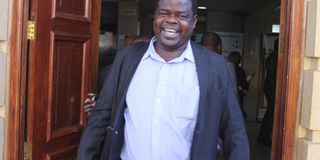Why Omtatah wants EACC stripped of power to probe crimes

Activist Okiya Omtatah. He wants the EACC stopped from investigating criminal cases. PHOTO | FILE | NATION MEDIA GROUP
What you need to know:
- Activist Okiya Omtatah said the Commission acts beyond its jurisdiction and powers.
- He said the Constitution does not allow Parliament a free hand to create a Commission as a crime busting entity.
- But the DPP argues that the EACC complements the police in investigating corruption and economic crimes.
- The DPP said the Court of Appeal upheld a decision which stated that EACC powers is not limited to enforcement of Chapter Six of the Constitution.
Parliament has been faulted for giving the Ethics and Anti-Corruption Commission (EACC) powers to investigate corruption cases.
While urging the High Court to quash sections of the law that give EACC the mandate to investigate corruption and fraud, activist Okiya Omtatah on Thursday said the Commission acts beyond its jurisdiction and powers, thereby “altering the basic structures of the Constitution”.
JURISDICTION
He told Justice George Odunga, Chacha Mwita and John Mativo that the Constitution does not allow Parliament a free hand to create a Commission as a crime busting entity.
Mr Omtatah accused the EACC of “killing” serious crime through shoddy investigations. He cited scams such as the theft at the National Youth Service (NYS) and loss of funds at Afya House.
The activist said EACC can only ensure compliance with Chapter Six of the Constitution and once it encounters corruption, they should report it to the police.
“They should leave criminal investigations, including fraud and other forms of crime associated with corruption, to the National Police Service,” he said.
Mr Omtatah said that the Constitution mandated Parliament to create the Commission as per Article 79 (which establishes the EACC), for purposes of enforcing Chapter Six and the code of conduct for state officers. He added that investigating corruption falls within the mandate of the police and Parliament was wrong by handing EACC an extra mandate.
POWERS
Mr Omtatah said EACC does not have the power to summon witnesses and Section 2 of the EACC Act is therefore unconstitutional.
The sentiments were supported by lawyer Ochieng Oduol, who is acting for former Nairobi Governor Evans Kidero, who has faulted the Commission for investigating his banks accounts. The lawyer said that EACC obtained warrants to investigate the accounts from a Makadara court without disclosing that similar prayers had been declined by another court.
Mr Oduol said the Commission violated Mr Kidero’s rights to privacy and maintained that it does not have powers to undertake criminal investigations.
The Attorney-General opposed the application, saying that any move to challenge EACC’s power to investigate criminal cases is challenging the validity of the Constitution.
The AG added that the Constitution mandates Parliament to create a commission to deal with anti-corruption issues and perform any other functions provided by legislation.
MANDATE
The Director of Public Prosecutions, through Frederick Ashimosi, said the Court of Appeal upheld a decision which stated that EACC powers is not limited to enforcement of Chapter Six of the Constitution.
He said EACC complements the police in investigating corruption and economic crimes.
Ms Caroline Nyaga for EACC asked the judges to interpret the Constitution purposively and protect the intention of its framers.
She said that while investigating private citizens, EACC seeks to recover public funds or assets that might have been improperly acquired.
Ms Nyaga added that nothing prevents the police from working with the EACC and the Commission has the expertise and special skills that police do not necessarily have.
She said it would be absurd to deny bodies which have been mandate by statutes to perform their functions.
The judges said they would decide on the case on March 21.




